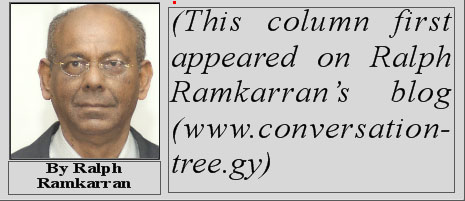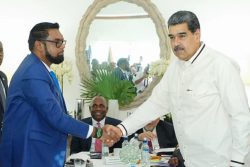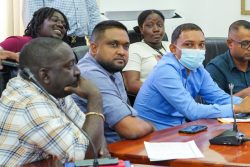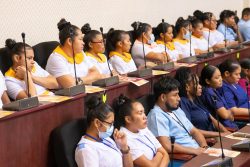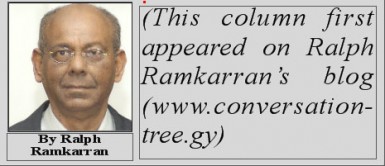 A report on the cost of food for each sitting of Parliament being $700,000 has triggered a particularly sharp debate about the cost and the alleged supply of alcohol. The Leader of the Opposition, Mr. Bharrat Jagdeo, confessed that he consumes the food. He said: “I eat the food. What do you suggest? I don’t eat the food? I eat the food…I like eating too. And it’s not like it’s fancy food. It’s not fancy food…” The problem, the teetotaler Mr. Jagdeo said, confirming the traditionally austere leadership of the PPP, was the alcohol. “It’s not just the food. It’s the huge amount of alcohol that gets consumed and imbibed in Parliament… fancy, fancy, liquor.” Mr. Jagdeo noted that Opposition members would hardly ever, if at all, utilise alcohol provided by Parliament Office. “They do eat. We eat. I eat the food,” he emphasized, “…but it’s the alcohol part that I have a problem with.” The politics also intruded. Mr. Jagdeo suggested that it was some Government members who excessively imbibed during sittings. After suggesting that the cost of the alcohol might be as much as the cost of food, he recommended that members purchase their own alcohol.
A report on the cost of food for each sitting of Parliament being $700,000 has triggered a particularly sharp debate about the cost and the alleged supply of alcohol. The Leader of the Opposition, Mr. Bharrat Jagdeo, confessed that he consumes the food. He said: “I eat the food. What do you suggest? I don’t eat the food? I eat the food…I like eating too. And it’s not like it’s fancy food. It’s not fancy food…” The problem, the teetotaler Mr. Jagdeo said, confirming the traditionally austere leadership of the PPP, was the alcohol. “It’s not just the food. It’s the huge amount of alcohol that gets consumed and imbibed in Parliament… fancy, fancy, liquor.” Mr. Jagdeo noted that Opposition members would hardly ever, if at all, utilise alcohol provided by Parliament Office. “They do eat. We eat. I eat the food,” he emphasized, “…but it’s the alcohol part that I have a problem with.” The politics also intruded. Mr. Jagdeo suggested that it was some Government members who excessively imbibed during sittings. After suggesting that the cost of the alcohol might be as much as the cost of food, he recommended that members purchase their own alcohol.
If the Leader of the Opposition were concerned that MPs would be drunk on their feet or otherwise in Parliament, he should not worry. The public, viewing debates and the heckling and cross-talking, would assume that MPs are drunk anyway – Government Members with power, and Opposition Members seeking it.
The Clerk to the Parliament, Mr. Sherlock Isaacs, politely explained that alcohol is provided only on special occasions. Minister Cathy Hughes was sharper and more combative, as political necessity dictates. The angry Minister accused the Leader of the Opposition of “ranting and raving and lying deliberately, misrepresenting the facts.” Minister Hughes said that the parliamentary lounge she is familiar with does not serve alcohol but a variety of teas, juices and water. But on special occasions, such as Christmas and other special events, alcohol is served. It is also served at the MPs’ expense when it’s a personal occasion, such as a birthday. The Minister also explained that meals are supplied for 300 persons, which include Parliament staff working during Sittings, media personnel and some drivers, including those of Mr. Jagdeo. She said the cost works out to US$11 per person.
So much for the politics. What about the Opposition MPs who do not imbibe in Parliament but who like a drink or two, or maybe three? Some of us would understand that it is not that Opposition MPs, who are so inclined (and I can name some), do not imbibe in Parliament. They dare not do so. This is unwarranted. The alcohol is not served while Parliament is sitting. The restriction only means that MPs are prohibited from socialising. This is detrimental to relationships and deliberations in a more sober manner, so to speak, which facilitates consensus, unless this is not what is sought. However, in the past, this has never prevented MPs from imbibing. In times past, during the obligatory suspension of the House in the early evening, some Members would consume the golden brown at Demico House, across the road from Parliament Buildings, and return to the House late, walking in with unusually slow but erect gaits, struggling exaggeratedly not to stagger as they enter the House.
The quarrel in Parliament over food and drink is most unusual because it is MPs themselves who created this situation. When I first entered Parliament as an MP in 1997, MPs were served “tea,” consisting of non-alcoholic beverages and sandwiches. I resigned my seat in Parliament in 2000 at the request of President Jagdeo to sit on the Elections Commission for the 2001 elections. When I returned to Parliament as the Speaker in May 2001, a full lunch was served in paper plates with plastic forks and spoons. Consistent agitation by MPs led to the improvements in the presentation and quality that now prevail. The past and current governments have approved the parliamentary budgets after detailed consideration. It is hypocrisy to complain now.
But peculiar situations arise. Meals are chosen with an eye to the broad dietary choices that prevail in Guyana for religious and cultural reasons. But special consideration may apply to individual MPs. Some years ago, one MP informed the Clerk that for religious reasons, he/she could only consume duck, and an entire duck at a time, prepared in a special way, which he/she elaborated in detail. The Clerk thought it odd but complied. The MP consumed the duck in two meals at one sitting. Another MP learnt of the special privilege and demanded six curried boiled eggs per meal at every sitting. The Clerk again complied. Soon, another MP heard of these peculiar requests, and demanded, more modestly, curried chicken. Fearing escalating demands, the Clerk then referred the matter to me as Speaker. I revoked his decisions, to the chagrin of the MPs, particularly the MP with the peculiar religious predilection for that popular member of the waterfowl family.
